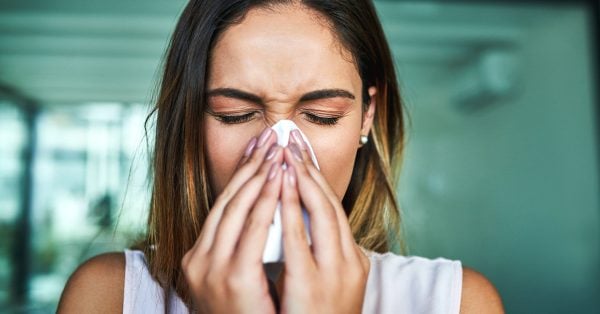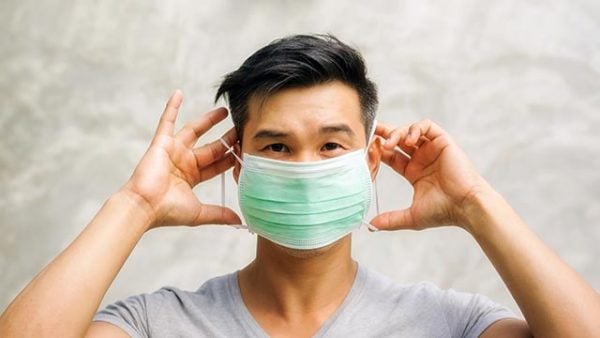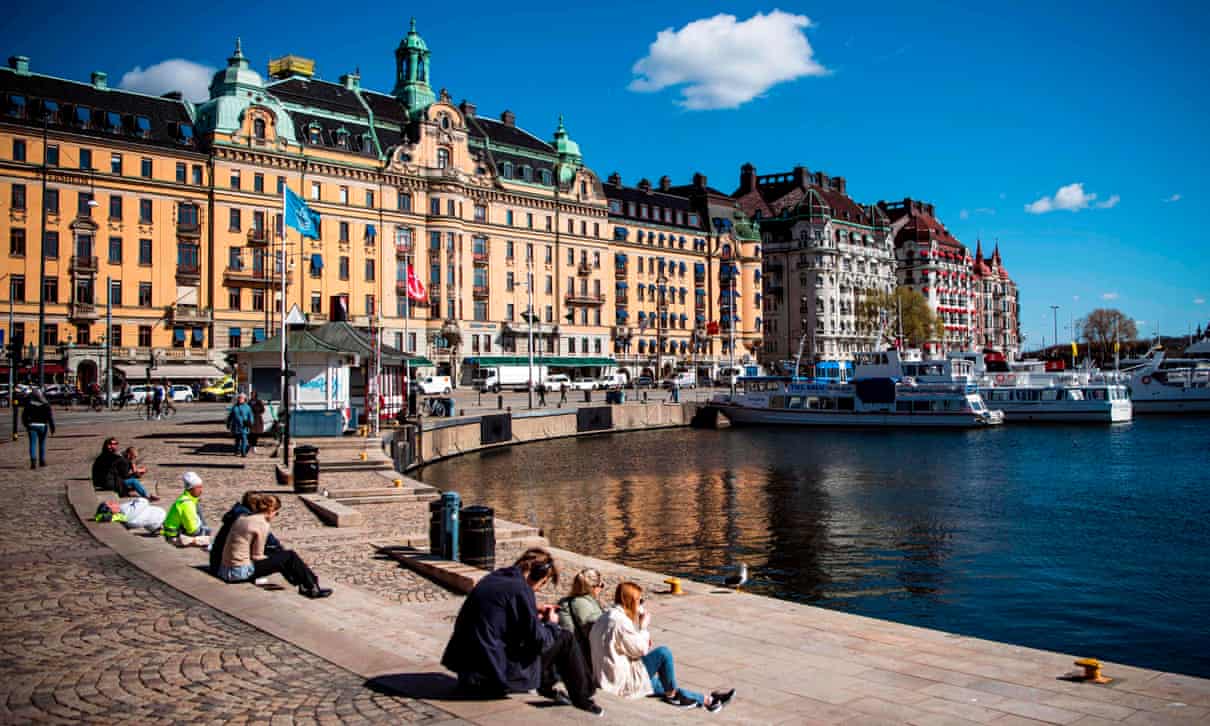Roll with the punches and just keep going.....
bloomberg.com
Sweden Says Controversial Covid-19 Strategy Is Proving Effective
By Niclas Rolander
5-6 minutes

Sign up here for our daily coronavirus newsletter on what you need to know, and subscribe to our Covid-19 podcast for the latest news and analysis.
Sweden’s unusual approach to fighting the coronavirus pandemic is starting to yield results, according to the country’s top epidemiologist.
Anders Tegnell, the architect behind Sweden’s relatively relaxed response to Covid-19, told local media the latest figures on infection rates and fatalities indicate the situation is starting to stabilize.
“We’re on a sort of plateau,” Tegnell told Swedish news agency TT.
Sweden has left its schools, gyms, cafes, bars and restaurants open throughout the spread of the pandemic. Instead, the government has urged citizens to act responsibly and follow social distancing guidelines.
The spread of Covid-19 across the globe is triggering different responses across national and even state borders, as authorities struggle to contain an outbreak about which much remains unknown.
It’s unclear which strategy will ultimately prove most effective, and even experts in Sweden warn it’s too early to draw conclusions. But given the huge economic damage caused by strict lockdowns, the Swedish approach has drawn considerable interest around the world.
Part of that approach relies on having access to one of the world’s best-functioning health-care systems. At no stage did Sweden see a real shortage of medical equipment or hospital capacity, and tents set up as emergency care facilities around the country have mostly remained empty.
Death Rates
As of Sunday, Sweden had reported 1,540 deaths tied to Covid-19, an increase of 29 from Saturday. That’s considerably more than in the rest of Scandinavia, but much less than in Italy, Spain and the U.K., both in absolute and relative terms.
Tegnell isn’t the only high-level official in Sweden to claim the country may be over the worst.
“The trend we have seen in recent days, with a more flat curve -- where we have many new cases, but not a daily increase -- is stabilizing,” Karin Tegmark Wisell, head of the microbiology department at Sweden’s Public Health Authority, said on Friday. “We are seeing the same pattern for patients in intensive care.”
Just two weeks ago, the picture was considerably bleaker, and Prime Minister Stefan Lofven suggested the government may need to review its approach amid the prospect of thousands of Swedish deaths. But Lofven’s personal popularity has soared, suggesting Swedes approve of his decisions.
“I have very high confidence in the Swedish authorities that manage this,” Volvo Cars CEO Hakan Samuelsson said in a phone interview. “It’s a hard balance to strike, but I have full confidence in the measures that Sweden has taken.”
Volvo, which was forced to halt production across Europe and furlough about 20,000 Swedish employees, will resume production at its Swedish plants on Monday.
“Our measures are all based on individuals taking responsibility, and that is also an important part of the Swedish model,” Samuelsson said.
The Economy
Sweden’s Covid-19 strategy may ultimately result in a smaller -- albeit historically deep -- economic contraction than the rest of Europe is now facing, according to HSBC Global Research economist James Pomeroy.
“While Sweden’s unwillingness to lock down the country could ultimately prove to be ill-judged, for now, if the infection curve flattens out soon, the economy could be better placed to rebound,” he said.
Pomeroy pointed to some Swedish characteristics that may be helping the country deal with the current crisis. More than half of Swedish households are single-person, making social distancing easier to carry out. More people work from home than anywhere else in Europe, and everyone has access to fast Internet, which helps large chunks of the workforce stay productive away from the office.
And while many other countries have introduced strict laws, including hefty fines if people are caught breaching newly minted social-distancing laws, Swedes appear to be following such guidelines without the need for legislation. Trips from Stockholm to Gotland -- a popular vacation destination -- dropped by 96% over the Easter weekend, according to data from the country’s largest mobile operator, Telia Company. And online service Citymapper’s statistics indicate an almost 75% drop in mobility in the capital.
Sweden also recently pushed back against the notion that there’s little to no social distancing going on.
“We don’t have a radically different view,” Foreign Minister Ann Linde said in an interview with Radio Sweden. “The government has made a series of decisions that affect the whole society. It’s a myth that life goes on as normal in Sweden.”
bloomberg.com
Sweden Says Controversial Covid-19 Strategy Is Proving Effective
By Niclas Rolander
5-6 minutes
Sign up here for our daily coronavirus newsletter on what you need to know, and subscribe to our Covid-19 podcast for the latest news and analysis.
Sweden’s unusual approach to fighting the coronavirus pandemic is starting to yield results, according to the country’s top epidemiologist.
Anders Tegnell, the architect behind Sweden’s relatively relaxed response to Covid-19, told local media the latest figures on infection rates and fatalities indicate the situation is starting to stabilize.
“We’re on a sort of plateau,” Tegnell told Swedish news agency TT.
Sweden has left its schools, gyms, cafes, bars and restaurants open throughout the spread of the pandemic. Instead, the government has urged citizens to act responsibly and follow social distancing guidelines.
The spread of Covid-19 across the globe is triggering different responses across national and even state borders, as authorities struggle to contain an outbreak about which much remains unknown.
It’s unclear which strategy will ultimately prove most effective, and even experts in Sweden warn it’s too early to draw conclusions. But given the huge economic damage caused by strict lockdowns, the Swedish approach has drawn considerable interest around the world.
Part of that approach relies on having access to one of the world’s best-functioning health-care systems. At no stage did Sweden see a real shortage of medical equipment or hospital capacity, and tents set up as emergency care facilities around the country have mostly remained empty.
Death Rates
As of Sunday, Sweden had reported 1,540 deaths tied to Covid-19, an increase of 29 from Saturday. That’s considerably more than in the rest of Scandinavia, but much less than in Italy, Spain and the U.K., both in absolute and relative terms.
Tegnell isn’t the only high-level official in Sweden to claim the country may be over the worst.
“The trend we have seen in recent days, with a more flat curve -- where we have many new cases, but not a daily increase -- is stabilizing,” Karin Tegmark Wisell, head of the microbiology department at Sweden’s Public Health Authority, said on Friday. “We are seeing the same pattern for patients in intensive care.”
Just two weeks ago, the picture was considerably bleaker, and Prime Minister Stefan Lofven suggested the government may need to review its approach amid the prospect of thousands of Swedish deaths. But Lofven’s personal popularity has soared, suggesting Swedes approve of his decisions.
“I have very high confidence in the Swedish authorities that manage this,” Volvo Cars CEO Hakan Samuelsson said in a phone interview. “It’s a hard balance to strike, but I have full confidence in the measures that Sweden has taken.”
Volvo, which was forced to halt production across Europe and furlough about 20,000 Swedish employees, will resume production at its Swedish plants on Monday.
“Our measures are all based on individuals taking responsibility, and that is also an important part of the Swedish model,” Samuelsson said.
The Economy
Sweden’s Covid-19 strategy may ultimately result in a smaller -- albeit historically deep -- economic contraction than the rest of Europe is now facing, according to HSBC Global Research economist James Pomeroy.
“While Sweden’s unwillingness to lock down the country could ultimately prove to be ill-judged, for now, if the infection curve flattens out soon, the economy could be better placed to rebound,” he said.
Pomeroy pointed to some Swedish characteristics that may be helping the country deal with the current crisis. More than half of Swedish households are single-person, making social distancing easier to carry out. More people work from home than anywhere else in Europe, and everyone has access to fast Internet, which helps large chunks of the workforce stay productive away from the office.
And while many other countries have introduced strict laws, including hefty fines if people are caught breaching newly minted social-distancing laws, Swedes appear to be following such guidelines without the need for legislation. Trips from Stockholm to Gotland -- a popular vacation destination -- dropped by 96% over the Easter weekend, according to data from the country’s largest mobile operator, Telia Company. And online service Citymapper’s statistics indicate an almost 75% drop in mobility in the capital.
Sweden also recently pushed back against the notion that there’s little to no social distancing going on.
“We don’t have a radically different view,” Foreign Minister Ann Linde said in an interview with Radio Sweden. “The government has made a series of decisions that affect the whole society. It’s a myth that life goes on as normal in Sweden.”










